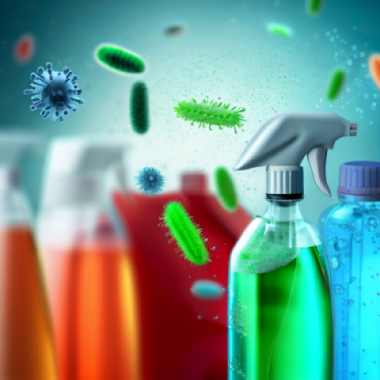Table of Contents
Household Disinfectants and Drug-Resistant Bacteria
In recent years, the world of science and health has been abuzz with the potential link between household disinfectants and drug-resistant bacteria. This article aims to explore the intriguing findings from a study published in October 2023 by Macquarie University’s Lighthouse, shedding light on how residues from these common disinfectants might contribute to the rise of drug-resistant bacteria.
The age-old practice of using household disinfectants to maintain a clean and hygienic living environment has been deeply ingrained in our daily lives. However, the repercussions of this routine may be more complex and far-reaching than we ever imagined.
The Study Unveiled
The study, conducted by a team of dedicated researchers at Macquarie University, delves into the potential consequences of household disinfectants on bacteria in our homes. What sets this research apart is its rigorous scientific approach to the issue, aligning perfectly with our pursuit of holistic well-being.
Unmasking Residue’s Role
At the heart of this study lies the revelation that the residues left behind by these disinfectants may not be as harmless as we thought. The research strongly suggests that these residues could be contributing to the development of drug-resistant bacteria. The implications are profound, considering the growing global concern surrounding antibiotic resistance.
The Science Behind It
To understand the connection between household disinfectants and drug-resistant bacteria, we need to delve into the science of it.
Residue Accumulation
Household disinfectants are often sprayed or wiped onto surfaces, eliminating bacteria on contact. However, they can leave behind a thin film of residue. The daily use of disinfectants leads to a gradual buildup of residue on various surfaces, from kitchen countertops to doorknobs. These seemingly harmless films become fertile grounds for bacteria, providing them with a place to thrive and develop resilience. Over time, this residue accumulates, creating a breeding ground for bacteria that can resist common antibiotics.
Drug Resistance Mechanism
As bacteria come into contact with disinfectant residues, they are exposed to sublethal doses of these chemicals. As bacteria repeatedly encounter these disinfectant residues, they adapt to the chemical agents present. This adaptation can result in the development of mechanisms to resist the disinfectants, which often coincide with their resistance to antibiotics.
A Growing Concern
The implications of this study are both fascinating and concerning. While we all strive to maintain clean homes, we might unknowingly be nurturing a new generation of drug-resistant bacteria.
Antibiotic Crisis Looms
With antibiotic resistance already posing a significant threat to public health, this new revelation adds to our concerns. The more drug-resistant bacteria that emerge, the fewer treatment options we have available.
The Two-Fold Threat
The study conducted by Macquarie University’s Lighthouse team sheds light on a two-fold threat: the potential increase in drug-resistant bacteria and the broader concern of antibiotic resistance.
The Emergence of Drug Resistance
Residue-exposed bacteria can acquire drug resistance through several mechanisms, including genetic mutations and the acquisition of resistance genes. This not only endangers our household hygiene but also raises alarms in the context of healthcare facilities.
Antibiotic Resistance Compounded
The same mechanisms that bacteria employ to resist disinfectants are often the very ones that allow them to evade antibiotics. This linkage magnifies the gravity of the situation, as the antibiotics we rely on to treat infections become less effective.

The Way Forward
In the face of these findings, it is crucial to consider the choices we make in maintaining a clean home.
Responsible Disinfectant Use
While it’s unrealistic to abandon disinfectants altogether, responsible use can make a significant difference. Following the product instructions, diluting when necessary, and ensuring proper ventilation during and after use are steps in the right direction.
Exploring Alternatives
In light of this research, exploring alternative cleaning methods is becoming increasingly popular. Natural products such as vinegar, hydrogen peroxide, and essential oils like tea tree oil are effective disinfectants without the residue concern.
In conclusion, the research conducted by Macquarie University’s Lighthouse team highlights the importance of understanding the unintended consequences of our daily practices. Household disinfectants play a pivotal role in our lives, but it is crucial to use them wisely and consider alternative, more environmentally friendly options.

FAQs
1. Are all household disinfectants equally harmful in terms of residue buildup?
- Residue buildup can vary depending on the type and brand of disinfectant. Some may leave more residue than others.
2. Can we completely avoid using household disinfectants?
- While it’s challenging to avoid disinfectants entirely, there are natural and eco-friendly alternatives available.
3. How can I reduce the residue left behind by disinfectants?
- Properly following the usage instructions and wiping surfaces after disinfection can help reduce residue buildup.
4. What are the alternatives to chemical disinfectants?
- Alternatives include vinegar, hydrogen peroxide, and essential oils like tea tree oil, which have natural disinfectant properties.
5. What role can individuals play in mitigating this issue?
- Raising awareness and using disinfectants responsibly can contribute to minimizing the problem of residue-related antibiotic resistance.
Reference:
Disclaimer
If you want to read more information about healthcare, fitness, and much more related to healthcare, just visit –>Health is Wealth – A simple wellness routine and knowledge to safeguard precious health. (cbdnep.com)


